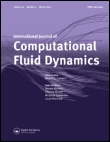
INTERNATIONAL JOURNAL OF COMPUTATIONAL FLUID DYNAMICS
Scope & Guideline
Connecting Researchers and Practitioners in CFD Excellence
Introduction
Aims and Scopes
- Numerical Methods Development:
The journal is committed to the development of advanced numerical methods, including high-order schemes, adaptive mesh refinement, and new discretization techniques, to enhance the accuracy and efficiency of fluid dynamics simulations. - Applications in Aerospace and Engineering:
It seeks to publish works that apply CFD methods to real-world engineering problems, particularly in aerospace, mechanical engineering, and environmental studies, showcasing the practical impact of computational techniques. - Multiphase and Complex Flows:
Research focusing on multiphase flow dynamics, including interactions of different phases and complex geometries, is a significant area of interest, reflecting the journal's commitment to addressing challenging fluid dynamics problems. - Integration of Machine Learning:
The journal highlights the integration of machine learning and artificial intelligence with traditional CFD methods, aiming to improve predictive capabilities and optimize simulations. - Uncertainty Quantification and Sensitivity Analysis:
A focus on uncertainty quantification techniques in CFD, exploring how variations in input parameters affect simulation outcomes, is also central to the journal's scope.
Trending and Emerging
- High-Order Numerical Methods:
There is a significant trend towards the development and application of high-order numerical methods, which improve the accuracy and convergence rates of CFD simulations, particularly in complex flow scenarios. - Machine Learning Integration:
The integration of machine learning techniques into CFD is rapidly emerging, with studies exploring how AI can enhance modeling, reduce computational costs, and improve predictive accuracy. - Hypersonic Flow Simulations:
Research on hypersonic flows is gaining prominence due to its relevance in aerospace applications, reflecting a growing interest in accurately modeling extreme flow conditions. - Multiphase Flow Dynamics:
The exploration of multiphase flows, particularly in industrial and environmental contexts, is increasingly highlighted, emphasizing the complexities and interactions between different phases. - Adaptive Mesh Techniques:
Emerging interest in adaptive mesh techniques is evident, focusing on dynamically refining mesh resolution based on flow features to enhance simulation accuracy without excessive computational cost.
Declining or Waning
- Basic Turbulence Models:
There has been a noticeable decline in publications focused on basic turbulence models, such as RANS (Reynolds-Averaged Navier-Stokes) equations, as researchers increasingly explore more sophisticated approaches like LES (Large Eddy Simulation) and DNS (Direct Numerical Simulation). - Low-Fidelity Approaches:
Low-fidelity modeling techniques are becoming less common, as the field moves towards high-fidelity simulations that offer more accurate representations of fluid flows, particularly in complex environments. - Conventional Finite Element Methods:
Traditional finite element methods are less frequently featured, with a growing emphasis on high-order methods and meshless techniques that provide improved accuracy and efficiency in simulations. - Static Geometrical Analysis:
Research centered on static or less dynamic geometrical analyses is waning, as the journal increasingly emphasizes dynamic and transient flow simulations that better reflect real-world applications. - Single-Phase Flow Studies:
There is a decline in studies focusing solely on single-phase flows, as the interest shifts towards more complex, multiphase interactions that are critical in industrial applications.
Similar Journals
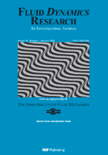
FLUID DYNAMICS RESEARCH
Pioneering Discoveries in Fluid Flow and Transfer ProcessesFLUID DYNAMICS RESEARCH, published by IOP Publishing Ltd, is a pivotal journal dedicated to advancing the understanding of fluid dynamics through interdisciplinary research that spans several domains including mechanical engineering and physics. With an ISSN of 0169-5983 and E-ISSN 1873-7005, this journal provides a vital platform for researchers aiming to disseminate new findings and theoretical advancements in fluid flow and transfer processes. As of 2023, FLUID DYNAMICS RESEARCH holds a commendable position within the academic community, ranked Q3 in fluid flow and transfer processes, mechanical engineering, and miscellaneous physics and astronomy categories. The journal showcases a diverse array of articles that not only inspire collaboration among professionals and students but also ensure that theoretical and experimental studies are accessible for further development in the field. Operating from the United Kingdom, the journal offers a unique opportunity for scholars worldwide to contribute to the vibrant community dedicated to understanding the complexities of fluid dynamics, even as it anticipates converging its years of research from 1986 to 2024.

ARCHIVE FOR RATIONAL MECHANICS AND ANALYSIS
Leading the Way in Scholarly Discourse and AnalysisArchive for Rational Mechanics and Analysis, published by Springer, is a prestigious journal that has been a cornerstone in the fields of analysis, mathematics, and mechanical engineering since its inception in 1957. With an impressive impact factor and top-tier quartile rankings in 2023, it stands as a leader in disseminating high-quality research, holding the Q1 designation in both analysis and mathematics, alongside notable recognition in mechanical engineering. The journal has achieved remarkable Scopus rankings, positioned in the 95th percentile for mathematics analysis and the 92nd percentile for miscellaneous mathematics, which underscores its critical role in advancing scholarly discourse. Researchers and professionals are encouraged to explore its rich archive of innovative studies and practical applications, which contribute significantly to the body of knowledge in rational mechanics. Although Open Access options are not available, the journal remains a vital resource for those dedicated to pushing the boundaries of mechanical analysis and its related mathematical frameworks.
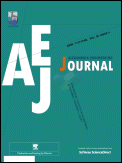
Alexandria Engineering Journal
Connecting scholars and practitioners in engineering excellence.Alexandria Engineering Journal is a premier open access publication dedicated to advancing the field of engineering. Published by ELSEVIER and headquartered in Amsterdam, the Netherlands, this journal has been at the forefront of disseminating innovative research since its inception in the year 2000. With its impressive Q1 ranking within the Engineering (miscellaneous) category and a notable position as #20 out of 307 in the Scopus rankings, it serves as a vital resource for scholars and practitioners alike, ensuring that cutting-edge findings reach a global audience. The journal is accessible to all since adopting open access policies in 2010, thereby facilitating the sharing of valuable insights without barriers. As we approach the convergence of years from 2000 to 2024, the Alexandria Engineering Journal continues to play a pivotal role in shaping engineering practices and underpinning significant advancements in the field.
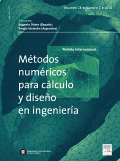
Revista Internacional de Metodos Numericos para Calculo y Diseno en Ingenieria
Empowering Innovation in Applied Mathematics and EngineeringRevista Internacional de Metodos Numericos para Calculo y Diseno en Ingenieria is a prominent academic journal dedicated to the dissemination of innovative research and methodologies in the fields of applied mathematics and engineering. Published by SCIPEDIA S L in Spain, this journal has been an essential resource for researchers since its inception in 1987, transitioning to an Open Access model in 2016 to enhance accessibility and foster collaboration among professionals and academics globally. Currently indexed in Scopus, it holds a Q4 category designation in both applied mathematics and miscellaneous engineering fields for 2023, reflecting its focus on advancing numerical methods to solve engineering problems. Despite ranking at the lower percentile, it serves as a vital platform for emerging scholars and practitioners aiming to contribute to cutting-edge developments in numerical techniques and engineering design. The journal's commitment to providing a forum for new ideas makes it an invaluable asset for students, researchers, and industry professionals seeking to stay abreast of advancements in the discipline.

INTERNATIONAL JOURNAL OF OFFSHORE AND POLAR ENGINEERING
Pioneering Research for Harsh EnvironmentsINTERNATIONAL JOURNAL OF OFFSHORE AND POLAR ENGINEERING, published by the International Society of Offshore and Polar Engineers, is a prominent academic journal dedicated to advancing research in key engineering disciplines such as Civil, Mechanical, and Ocean Engineering. Established in 1991, the journal caters to a global audience, providing an essential platform for disseminating innovative findings and case studies pertinent to offshore and polar environments. With a focus on practical and theoretical applications, the journal ranks in the Q3 category across its relevant fields as of 2023, reflecting its significant contribution to civil and structural engineering, mechanical engineering, and ocean engineering. Although it does not offer open access, its rigorous peer-review process ensures that only high-quality research is published, making it a critical resource for researchers, industry professionals, and students invested in the dynamics of offshore and polar engineering. The journal's commitment to exploring emerging challenges and technological advancements underlines its importance in shaping the future of engineering practices in some of the world's most extreme environments.

COMPUTATIONAL MECHANICS
Leading the Charge in Computational Engineering ExcellenceCOMPUTATIONAL MECHANICS, published by SPRINGER, is a premier international journal that focuses on the intersection of applied mathematics, engineering, and computational methods. With a commendable Q1 ranking in multiple categories, including Applied Mathematics and Mechanical Engineering, this journal is pivotal for disseminating groundbreaking research and innovative methodologies that advance the field. The journal has steadily contributed to the academic community since its inception in 1986 and continues to lead discussions and practices in computational mechanics and related disciplines. With a robust impact reflected in its Scopus rankings—placing it within the top percentiles across various categories—COMPUTATIONAL MECHANICS serves as a crucial platform for researchers, professionals, and students seeking to explore and contribute to significant advancements in computational theory and mathematical applications. Although it does not currently operate under an open access model, the journal ensures wide accessibility through libraries and institutional subscriptions, fostering a rich exchange of knowledge in the global scientific community.
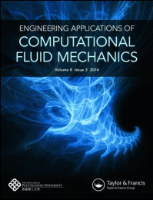
Engineering Applications of Computational Fluid Mechanics
Pioneering Solutions in Fluid Mechanics ApplicationsEngineering Applications of Computational Fluid Mechanics is an esteemed journal published by Taylor & Francis Ltd that serves as a vital resource for researchers, professionals, and students in the field of fluid mechanics and its computational applications. With an ISSN of 1994-2060 and an E-ISSN of 1997-003X, this journal has established its reputation through its rigorous peer-review process and commitment to Open Access since 2015, facilitating widespread dissemination of cutting-edge research. Based in the United Kingdom, the journal is indexed in leading databases and has achieved a significant impact in its categories, ranking in the top quartile (Q1) for both Computer Science (miscellaneous) and Modeling and Simulation as of 2023. Notably, its Scopus rankings place it in the top 4% of Mathematics/modeling and simulation, highlighting its importance in advancing knowledge and innovation within the discipline. The journal invites contributions that explore both theoretical and practical aspects of computational fluid dynamics, fostering collaboration and intellectual growth within the community.

MECCANICA
Shaping the Future of Mechanics and Material ScienceMECCANICA, an esteemed journal published by Springer, stands at the forefront of research in the fields of Condensed Matter Physics, Mechanical Engineering, and Mechanics of Materials. Established in 1966 and continuing through 2024, this journal provides a robust platform for the dissemination of innovative research and advancements in these increasingly interconnected domains. With an impressive 2023 ranking placing it in the Q2 category across multiple fields, MECCANICA boasts a Scopus rank of #198 in Mechanical Engineering, #150 in Condensed Matter Physics, and #141 in Mechanics of Materials, highlighting its significance and influence within the scholarly community. The journal aims to foster dialogue among researchers, professionals, and students, facilitating the exchange of cutting-edge ideas and methodologies crucial for overcoming contemporary engineering and physics challenges. Readers can access a wealth of knowledge through its comprehensive articles, and while it does not currently offer open access, the journal remains instrumental in shaping the future of engineering and physical sciences.
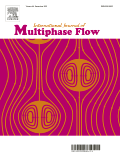
INTERNATIONAL JOURNAL OF MULTIPHASE FLOW
Advancing the Frontiers of Fluid DynamicsINTERNATIONAL JOURNAL OF MULTIPHASE FLOW, published by Pergamon-Elsevier Science Ltd, is a premier platform dedicated to the dissemination of cutting-edge research in the field of multiphase flow. With an impressive impact factor and ranking in the Q1 category across various disciplines including Fluid Flow and Transfer Processes, Mechanical Engineering, and Physics and Astronomy, this journal serves as a crucial resource for researchers and professionals aiming to advance knowledge and applications in fluid dynamics. Since its inception in 1973, the journal has established a distinguished legacy, providing a venue for high-quality research articles, comprehensive reviews, and technical notes that push the boundaries of current understanding. Although it does not offer Open Access options, its rigorous peer-review process ensures that only the most relevant and significant contributions are published, making it a vital source for students and experts alike striving for excellence in their fields. The journal is based in Kidlington, Oxford, United Kingdom, and continues to be a pivotal part of scholarly discourse in multiphase flow research.

Journal of Computational and Nonlinear Dynamics
Transforming Theoretical Advances into Practical Applications.Welcome to the Journal of Computational and Nonlinear Dynamics, a leading publication in the fields of applied mathematics, control and systems engineering, and mechanical engineering, published by the esteemed American Society of Mechanical Engineers (ASME). With an ISSN of 1555-1423 and an E-ISSN of 1555-1415, this journal has been a vital resource since its inception in 2006, promoting high-quality research and innovative methodologies aimed at solving complex engineering problems. With a commendable impact in academic circles, it ranks in the Q3 quartile for Applied Mathematics and Control and Systems Engineering, and Q2 for Mechanical Engineering as of 2023. The journal facilitates the dissemination of research findings, theoretical advancements, and practical applications, making it an essential platform for researchers, professionals, and students looking to advance their knowledge and engage with cutting-edge dynamics research. While currently not available as an open-access publication, subscribers benefit from a wealth of scholarly articles that contribute to the academic community's understanding of computational and nonlinear dynamics in various engineering disciplines.